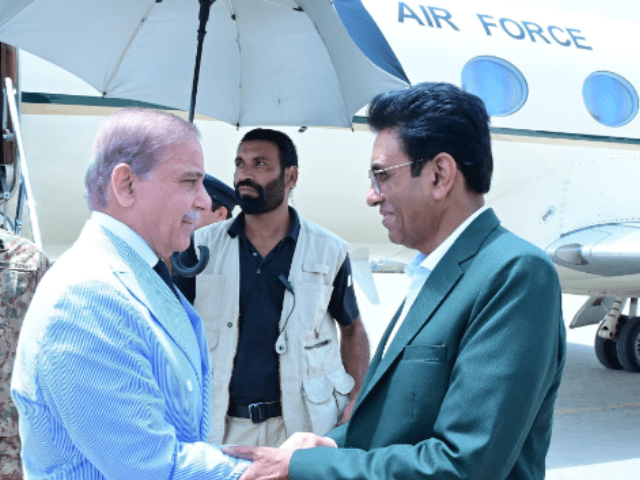Prime Minister Shehbaz Sharif arrived in Karachi on Monday for a day visit, where he paid tribute to the staff of the Pakistani navy for their role in the defense of the country’s maritime borders.
Upon arrival, he was received by the Federal Minister of Education, Dr. Khalid Maqbool Siddiqui.
During the visit, the Prime Minister visited the shipyard of the Pakistani navy and met with officers and naval staff. He praised their service during “Marka E Haq”, a military operation aimed at securing the coastal waters of Pakistan.
In his speech, Shehbaz Sharif congratulated the officers and sailors for their dedication and their professionalism in the safeguard of national interests at sea.
He was accompanied by the Federal Minister of Defense Khawaja Asif, the Federal Minister for Planning and Development Ahsan Iqbal, and the Federal Minister of Information and Dissemination Attaullah Tarar.
The Prime Minister will also meet the chief minister of Sindh Murad Ali Shah and the governor during his stay in Karachi.
Last week, the Pakistani army announced the successful conclusion of operation Bunyanum Marsoos, a large -scale military reprisals launched on May 10, 2025, in response to deadly Indian attacks against Pakistani civilians in the night of May 6 and 7. The operation was part of the broader conflict that the conflict was described as “Marka-e-Haq”.
According to DG ISPR LT Gen Ahmed Sharif Chaudhry, Pakistan’s response involved the use of al-Fatah missiles, precision air strikes, killing drones and long-range artillery, targeting 26 Indian military installations through Jammu and cashmere and cashmere (IIOJK) and the continent.
Key sites included Srinagar, Jammu, Adampur, Sirsa, Pathankot and S-400 systems, as well as intelligence and logistics centers accused of supporting terrorism within Pakistan.
A ceasefire was reached following the intervention of American president Donald Trump, interrupting the climbing between the two nuclear weapons.
The ISPR underlined the coordination of the tri-service of the operation in the areas of air, land, sea and cyber. He also praised the media, scientists, political leadership and the nation for unified support.
Cyber-war operations were also carried out to temporarily deactivate the Indian military networks.
The Pakistan army accused India of simultaneously feeding terrorism at Khyber Pakhtunkhwa and Balutchistan during the conflict. The declaration ended with a warning that Pakistan’s response to any future assault would be “complete and decisive”.




